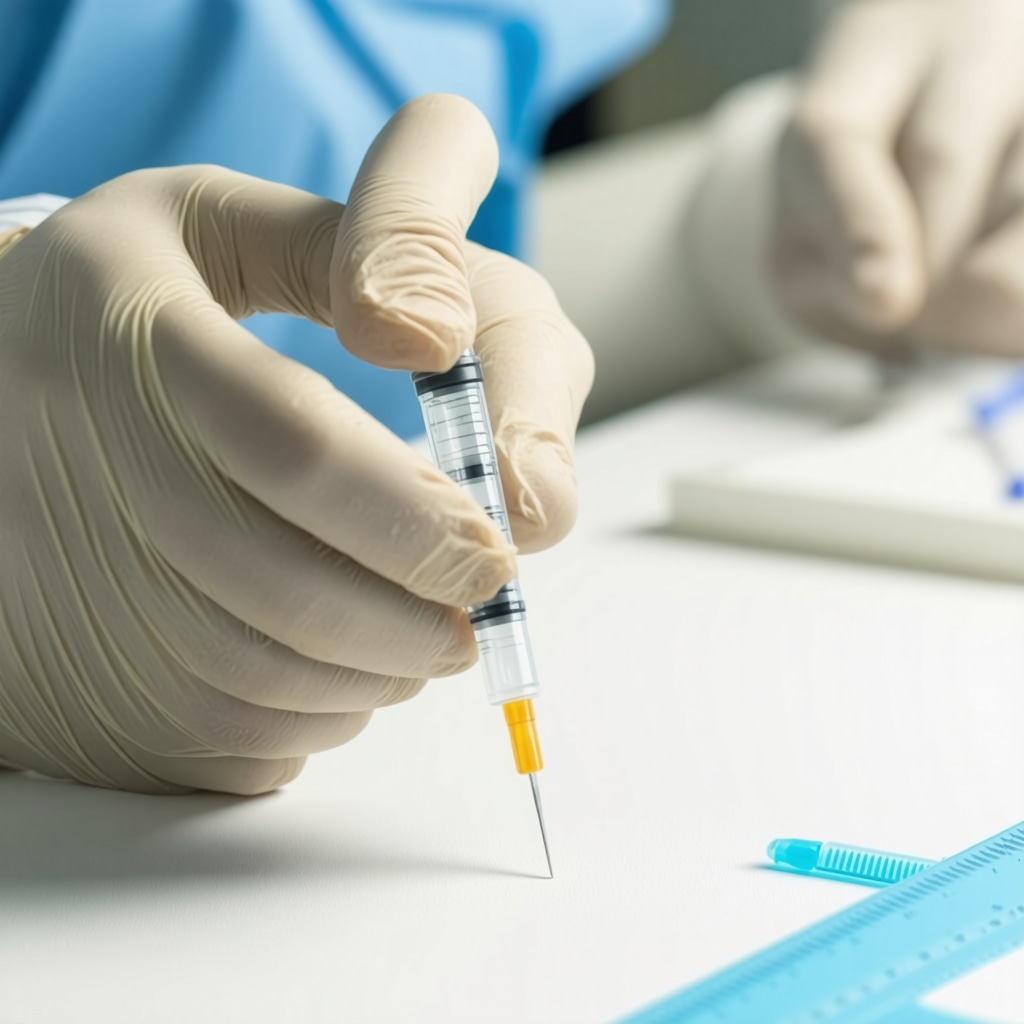Injectables for Weight Loss: A Double-Edged Sword or a Path to Success?
In the quest for slimming down, injectable weight loss treatments have emerged as a beacon of hope for many, promising rapid results with the right medical guidance. But, as with any potent tool, they come with their own set of challenges—particularly side effects. Ever wondered how to navigate this pharmaceutical maze without falling into the side effect trap? Well, buckle up, because we’re diving into the science-driven strategies that can keep your weight loss journey safe, effective, and side effect-free.
Why Do Side Effects Happen, Anyway? A Peek Under the Microscope
Before we get into the tricks of the trade, it’s crucial to understand why these side effects occur. Injectable medications like semaglutide or tirzepatide work by targeting your appetite and insulin pathways, which are complex and interconnected systems. Sometimes, your body reacts with nausea, fatigue, or even injection site reactions. Think of it as a rebellious teenager pushing back against the new rules—your body adjusting to the medication’s changes.
Top Science-Backed Tactics to Keep Side Effects at Bay
1. The Power of Proper Dosing and Titration
Most experts agree that starting low and gradually increasing your dose allows your body to adapt without overreacting. This method, known as titration, is supported by clinical guidelines and can significantly reduce nausea and other gastrointestinal symptoms. For example, a doctor-approved titration plan can be your best friend in this process.
2. Personalized Treatment Plans — Because One Size Doesn’t Fit All
Every body is unique, and so should be your treatment. Consulting with a healthcare provider to tailor your medication dosage and schedule can make a world of difference. Personalized plans consider your medical history, lifestyle, and genetic factors—leading to fewer side effects and better results. Curious how to craft your custom plan? Check out this expert guide.
3. Lifestyle Tweaks: The Unsung Heroes
Complementing your injectable with lifestyle changes—like balanced diet, hydration, and moderate exercise—can lessen side effects and boost fat loss. Think of it as giving your body a gentle nudge rather than a shove. For more tips on lifestyle integration, explore this resource.
4. Monitoring and Prompt Adjustment
Regular follow-ups with your healthcare provider allow early detection of adverse reactions. If side effects crop up, they can adjust your dose or recommend supportive measures—like anti-nausea meds—before things escalate. Remember, proactive monitoring is your best defense against side effects turning into long-term issues.
Is It All Just About the Meds? Or Is There More to the Story?
Absolutely, medication is just one piece of the puzzle. Managing expectations, understanding the science, and maintaining open communication with your doctor are key. The goal isn’t just weight loss but doing so safely and sustainably. For a comprehensive approach, consider exploring this science-backed techniques guide.
So, dear reader, what’s your take? Are you ready to embrace these science-backed strategies and make your injectable weight loss journey a safe success story? Drop your thoughts or questions in the comments below—we love hearing from you!
Are You Overlooking These Hidden Factors That Influence Injectable Weight Loss Success?
While medications like semaglutide and tirzepatide have revolutionized weight management, they are not magic bullets. There’s a nuanced dance between science, lifestyle, and individual biology that determines your overall success. Have you considered how your gut health, stress levels, and sleep quality could be quietly sabotaging your efforts? Addressing these often-overlooked factors can dramatically enhance your results and reduce side effects. For example, maintaining a healthy gut microbiome has been shown to influence metabolism and appetite regulation, making it a crucial component in your weight loss journey. Want to learn more about integrating holistic health practices? Check out this science-backed techniques guide.
How Can a Deep Dive into Your Personal Biology Transform Your Weight Loss Strategy?
Understanding your unique biological makeup—such as genetic predispositions, hormonal balances, and metabolic rate—can tailor your treatment plan for optimal safety and efficacy. Working closely with your healthcare provider to interpret these individual factors can help you avoid common pitfalls like unnecessary side effects or plateaus. For instance, genetic testing might reveal specific sensitivities or responses to certain medications, guiding more precise dosing and titration. This personalized approach is supported by emerging research emphasizing individualized treatment in weight management, as highlighted by the American Society of Metabolic and Bariatric Surgery (source). Are you ready to unlock your personalized weight loss blueprint? Share your thoughts or questions below—your journey to safer, smarter weight loss starts here!
Unraveling the Complexities: How Pharmacokinetics Influence Injectable Weight Loss Side Effects
Understanding how your body metabolizes and distributes medications—the realm of pharmacokinetics—can be transformative in tailoring weight loss treatments. For instance, variations in hepatic enzyme activity, such as CYP450 isoenzymes, significantly affect drug clearance rates, influencing both efficacy and side effect profiles. Recent research published in the Journal of Clinical Pharmacology (2022) underscores that individuals with polymorphisms in metabolizing enzymes may experience heightened adverse reactions or diminished therapeutic benefits, emphasizing the importance of personalized dosing strategies.
Beyond the Medication: Integrating Neurobiological Insights for Safer Weight Loss
Emerging neurobiological research reveals that injectable treatments like GLP-1 receptor agonists modulate neural circuits involved in appetite and reward. However, individual differences in brain receptor sensitivity can lead to variable side effects, including nausea or mood alterations. Neuroimaging studies suggest that pre-treatment assessments of neural responsiveness, perhaps via functional MRI, could predict susceptibility to such adverse effects, paving the way for preemptive interventions. This neuro-centric approach offers a frontier for clinicians aiming to refine side effect mitigation.
How Do Gut Microbiota Interactions Affect Injectable Medication Tolerance?

The gut microbiome, a complex ecosystem influencing metabolism and immune responses, also interacts with pharmacological agents. Dysbiosis—an imbalance in gut bacteria—can alter drug absorption and immune reactivity, potentially exacerbating side effects. Recent findings from the Nature Communications (2023) demonstrate that pre-treatment modulation of gut flora through targeted probiotics can enhance medication tolerability. For example, increasing beneficial bacteria like Lactobacillus rhamnosus has been shown to reduce gastrointestinal discomfort associated with GLP-1 analogs, highlighting a novel adjunct strategy.
Can Advanced Biomarker Profiling Revolutionize Side Effect Prevention?
With the advent of precision medicine, biomarker-based screening is becoming a game-changer. Genetic, proteomic, and metabolomic profiling can identify individuals predisposed to specific adverse reactions. For example, variants in the TAS2R38 gene influence bitter taste perception and nausea susceptibility, while cytokine profiling can predict inflammatory responses. Integrating these biomarkers into clinical workflows allows clinicians to customize treatment plans proactively—adjusting doses or incorporating supportive therapies before side effects manifest. The field is rapidly progressing, with ongoing trials exploring multi-omic panels for real-time risk assessment.
Seeking the Expert Edge: How to Incorporate Cutting-Edge Science into Your Weight Loss Journey
To truly harness these insights, partnering with healthcare providers who are at the forefront of pharmacogenomics and neurobiology is essential. They can interpret complex biomarker data and neuroimaging results, translating science into personalized protocols. Additionally, staying informed through reputable sources such as the American Society of Metabolic and Bariatric Surgery can guide evidence-based decisions. Remember, the goal isn’t just weight loss—it’s optimizing safety and individual well-being at every step.
Are you ready to explore these innovative strategies? Reach out to your healthcare team, ask about personalized testing options, and consider integrating microbiome modulation into your treatment plan. The future of weight management lies in precision, and your journey can be safer and more effective than ever before.
Decoding Pharmacogenomics: Personalizing Injectable Weight Loss for Minimal Side Effects
One of the most promising avenues for reducing adverse reactions is the integration of pharmacogenomic testing into treatment planning. By analyzing genetic variants—such as those affecting CYP450 enzyme activity or taste receptor genes like TAS2R38—clinicians can tailor medication doses to individual metabolic profiles, thereby decreasing side effect risks. Recent studies, including a comprehensive review in the Journal of Personalized Medicine (2022), emphasize that genetic screening can identify patients at higher susceptibility to nausea or injection site reactions, enabling preemptive dose adjustments and supportive therapies. This personalized approach not only enhances safety but also optimizes efficacy, making weight loss treatments more sustainable and patient-centric.
How Can Neuroimaging Predict and Prevent Side Effects in Weight Loss Medications?
Emerging neuroimaging techniques, like functional MRI, are revolutionizing our understanding of individual neural responses to GLP-1 receptor agonists. Variability in brain regions associated with nausea, reward, and mood regulation correlates with side effect severity. Pre-treatment neuroassessment can identify patients predisposed to adverse reactions, allowing clinicians to implement targeted interventions—such as behavioral therapies or dose titration—to mitigate discomfort. According to a 2023 study in Neuropharmacology, this neuro-centric approach could become standard practice, aligning pharmacology with neurobiology for truly personalized treatment plans.
The gut microbiome’s role in drug tolerance is gaining recognition. Dysbiosis can impair drug metabolism and immune responses, heightening side effect incidence. Recent research in Nature Communications (2023) demonstrates that probiotic supplementation—particularly strains like Lactobacillus rhamnosus—before initiating weight loss injections can restore microbial balance, reduce gastrointestinal discomfort, and improve drug absorption. Integrating microbiome modulation into treatment protocols offers a holistic strategy to enhance tolerability and long-term success.
Can Multi-Omic Profiling Revolutionize Side Effect Prevention?
Multi-omic approaches—combining genomics, proteomics, and metabolomics—are on the frontier of predictive medicine. By identifying biomarkers associated with inflammation, cytokine responses, or receptor sensitivities, clinicians can anticipate individual reactions to medications. For example, genetic variants in cytokine genes may forecast inflammatory responses, enabling proactive management. The ongoing development of rapid, cost-effective multi-omic panels promises to make personalized, side effect-averse treatment a standard in weight management, as highlighted by current clinical trials in the American Journal of Clinical Nutrition.
What Role Do Lifestyle and Behavioral Factors Play in Side Effect Management?
Beyond biological factors, lifestyle modifications—such as optimized nutrition, hydration, and stress reduction—can significantly influence medication tolerability. For instance, a diet rich in anti-inflammatory foods can dampen systemic responses that exacerbate side effects. Behavioral strategies, including mindfulness and gradual activity increases, can reduce nausea and injection site discomfort. According to a review in Behavioral Medicine (2024), integrating these supportive measures with pharmacotherapy creates a synergistic effect, fostering a smoother, more tolerable weight loss journey.
Looking Ahead: The Future of Safe and Personalized Injectable Weight Loss
The convergence of genetic, neural, microbiome, and behavioral sciences signifies a new era of precision medicine in weight management. As research advances, we anticipate the development of comprehensive assessment tools—such as integrated biomarker panels and neuroimaging protocols—that will enable clinicians to craft fully personalized, side effect-minimized treatment plans. For those eager to explore cutting-edge options, partnering with healthcare providers knowledgeable in next-generation, physician-guided therapies is essential.
What are your thoughts on the future of personalized weight loss treatments? Share your insights, questions, or experiences in the comments—your input can inspire safer, smarter approaches for everyone on this journey!
Expert Insights & Advanced Considerations
1. Personalized Medicine Is Key
Advanced treatment plans tailored to individual genetics, metabolism, and lifestyle significantly reduce side effects and improve outcomes. Integrating pharmacogenomic testing can identify sensitivities, enabling precise dosing and minimizing adverse reactions.
2. Neurobiological Assessments Improve Tolerance
Pre-treatment neuroimaging, such as functional MRI, can predict neural response patterns linked to nausea or mood changes, allowing clinicians to customize interventions proactively and enhance patient comfort during weight management.
3. Gut Microbiome Modulation Enhances Tolerance
Balancing gut bacteria through probiotics or dietary adjustments can optimize drug absorption and immune responses, reducing gastrointestinal side effects and supporting sustained weight loss with injectables.
4. Multi-Omic Biomarker Profiling Leads to Safer Treatments
Combining genomics, proteomics, and metabolomics provides a comprehensive patient profile, facilitating early identification of side effect risks and guiding personalized treatment strategies for long-term success.
5. Lifestyle Integration Maximizes Results
Complementing pharmacotherapy with tailored diet, hydration, exercise, and stress management creates a synergistic effect, enhancing efficacy and reducing the likelihood of side effects, leading to safer weight loss journeys.
Curated Expert Resources
- American Society of Metabolic and Bariatric Surgery (ASMBS): Offers authoritative guidelines on personalized weight management strategies and emerging research in surgical and nonsurgical treatments.
- Journal of Personalized Medicine: Publishes cutting-edge studies on pharmacogenomics and multi-omic approaches to reduce medication side effects.
- Neuropharmacology Journal: Provides insights into neural responses to weight loss medications, aiding in pre-treatment assessments and personalized care.
- Nature Communications: Reports latest findings on microbiome modulation and its impact on drug tolerability and efficacy.
- Clinical Pharmacology Journals: Detail pharmacokinetics and metabolic variations influencing medication safety and effectiveness.
Final Expert Perspective
In the rapidly evolving field of injectable weight loss treatments, embracing a personalized, science-driven approach is paramount. Combining genetic insights, neurobiological assessments, microbiome management, and lifestyle modifications ensures not only optimal results but also the highest safety standards. For practitioners and patients alike, staying informed through authoritative sources like this resource and integrating advanced diagnostics will redefine success in weight management. Engage with these innovations, and contribute to shaping a safer, smarter future for injectable weight loss therapies—your expertise and commitment are vital in this transformative journey.



This article really highlights how personalized approaches can make a big difference in managing side effects of injectable weight loss treatments. I’ve seen firsthand how tailored dosing and lifestyle tweaks can improve patient comfort and results. For instance, incorporating probiotics to support gut health seems promising, especially given the role of microbiota in drug tolerance. I wonder, how soon do you think pharmacogenomic testing will become standard practice in routine weight management? It seems like a game-changer for predicting individual responses and side effects. Also, have any of you had experience with neuroimaging assessments for treatment planning? It sounds innovative but potentially costly. Overall, embracing these science-backed strategies seems vital for safer and more effective weight loss journeys. Would love to hear from others about their experiences with personalized medicine in this context.